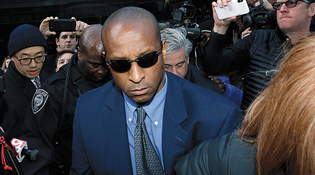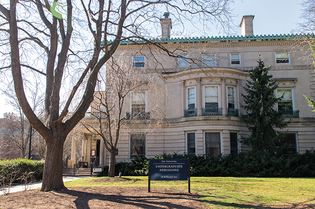 loading
loading
Light & VeritySoccer coach charged in admissions fraudYale promises reforms to prevent future abuse.  AP Photo/Steven SenneFormer women’s soccer coach Rudy Meredith left federal court in Boston on March 28 after pleading guilty to wire fraud and conspiracy charges. View full imageWhile much of Yale was on spring break, the university was rocked by the news that longtime women’s soccer coach Rudy Meredith had taken bribes in exchange for recommending students for admission to Yale as recruited athletes. The news came on March 12, when investigators announced charges in an alleged racketeering scheme centered on a California-based admissions counseling company known as The Edge College and Career Network. Indictments alleged that Edge helped some students cheat on SAT or ACT exams and helped some parents bribe coaches to falsely claim that their children were recruited athletes. Fifty people were charged, including Edge founder William Singer, coaches and other officials at several universities, and parents. The indictments in the case—dubbed “Operation Varsity Blues” by investigators—involved eight universities, including Stanford and Georgetown. The University of Southern California was implicated most heavily, with three coaches and an athletic director charged in cases involving more than two dozen students. At Georgetown, the tennis coach allegedly used three of his admissions slots in one year on fraudulent tennis players. But Yale and Meredith seemed to garner much of the press attention, at least on the East Coast.
Meredith, who had been head coach of women’s soccer at Yale since 1995, resigned at the end of last fall’s season. By then, he had been cooperating with the FBI since April 2018, after investigators had recorded him soliciting a bribe of $450,000 from a parent he was meeting in a Boston hotel room. He pleaded guilty on March 28 to wire fraud and conspiracy charges, and will be sentenced on June 20. Meredith acknowledged having taking $400,000 from one of Singer’s clients to have the client’s daughter designated a women’s soccer recruit, despite the fact that she did not play competitive soccer. Singer provided a false athletic profile of the student claiming she was co-captain of an elite club team in California. The student was admitted to the Class of 2022, and her relatives subsequently paid Singer’s organization $1.2 million, according to court documents. The student in the second case involving Meredith was not admitted to Yale. The case exposed a vulnerability to fraud in the admissions system. Within the bounds of the academic standards set by the Ivy League and the admissions office, coaches are able to endorse a limited number of applicants for admission; applicants with a coach’s endorsement are usually admitted. (Recruited athletes constitute about 13 percent of the undergraduate student body.) Since students who are admitted as recruited athletes do not receive athletic scholarships and are not required to play on a varsity team after they arrive at Yale, a fraud like Meredith’s could go undetected. To prevent fraud in the future, Yale’s athletic department will “review and confirm the athletic credentials of all recruits proposed to receive a coach’s athletic recommendation,” President Peter Salovey ’86PhD wrote in a message to the Yale community on March 26. In another statement, the university said it will hire outside advisers “to recommend changes that will help the university detect and prevent efforts to defraud its admissions process. . . . Yale will specifically examine the practices of commercial admissions consultants, whose work is conducted out of the view of admissions officers.” Salovey also reported that the university has rescinded the admission of the first-year student who had been admitted after Meredith’s recommendation and the $400,000 bribe. In an earlier message on March 15 about the case, Salovey had written, “When applicants sign their applications, they attest that the contents are true and complete. . . . Our longstanding policy is to rescind the admission of students who falsified their Yale College applications.” Whether the Yale student knew about the fraud has not been reported. The indictment documents include details from cases in other colleges suggesting that some parents tried to hide the scheme from their children; one was surprised to hear from an adviser at freshman orientation that he was on the track team.
 Kim O'MalleyAlthough the scandal put college admissions policies under scrutiny, no one at Yale’s admissions office was implicated in the incident. View full imageIn the March 26 message, Salovey also reported that the university had “confirmed the pre-admission athletic credentials of all members of our athletic teams who received an athletic endorsement during the admissions process, dating back to 2015.” And on March 12, he wrote that “we do not believe that any member of the Yale administration or staff other than the charged coach knew about the conspiracy.” A separate “frequently asked questions” page about the scandal on the president’s website includes the news that Meredith’s name had been removed from the head women’s soccer coach position, which had been endowed in his name by donors in 2013. The FAQ also said that the university general counsel’s office received a subpoena for information about Meredith on November 16, one day after Yale announced his resignation. The subpoena included a judge’s order not to disclose existence of the subpoena. In addition to the reforms described by Salovey, the university must deal with other fallout from the scandal. The US Department of Education wrote to Yale and the other seven universities on March 25 that it was opening a preliminary investigation to determine if any federal student aid funds were used fraudulently. Salovey said in his March 26 message that “we are reviewing the department’s requests and will respond appropriately.” On another front, two college students and their parents have filed a class-action suit against the eight universities. The students were rejected by some of the universities and are seeking to have their application fees reimbursed, claiming that the scheme demonstrates that the admissions process was not fair. “Had Plaintiffs known that the system was warped and rigged by fraud, they would not have spent the money to apply to the school,” the suit contends. “They also did not receive what they paid for—a fair admissions consideration process.” Yale officials had no comment on the suit. No Harvard officials or students were implicated in Operation Varsity Blues. But that university faced questions of its own in early April, when the Boston Globe reported that the father of a fencing recruit had bought the house of longtime Harvard fencing coach Peter Brand for $440,200 above its assessed value, selling it 17 months later at a $324,500 loss. The buyer of the house denies that the purchase was a bribe; Harvard says it is investigating. Asked for comment on Yale’s admissions process, Salovey stressed Yale’s “immediate actions to detect and prevent fraud.” He added that Yale seeks “the very best students, from all backgrounds,” and that today’s first-year class is the most socioeconomically diverse in Yale’s history. “When I learned about the admissions fraud, I was angered, disappointed, and saddened that individuals have schemed to cheat our admissions system when we have worked so hard for decades to overcome the challenges of access and affordability in higher education.”
The comment period has expired.
|
|